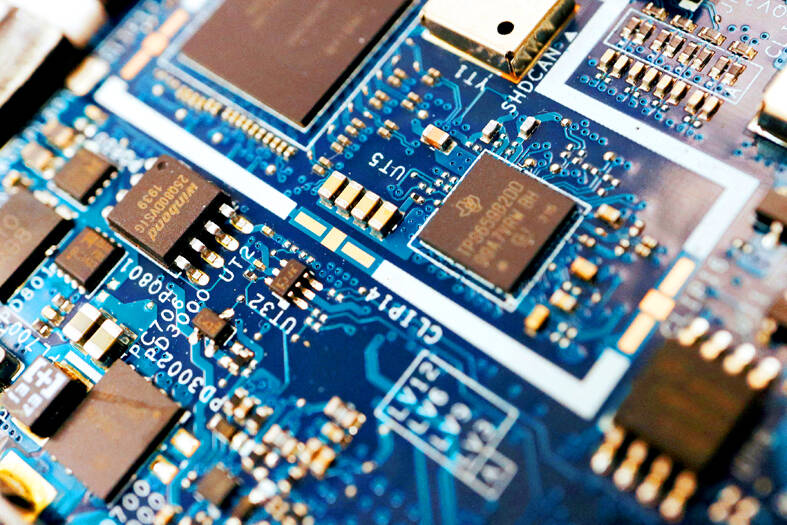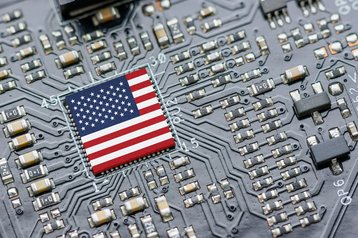US President Joe Biden’s administration is racing to complete CHIPS and Science Act agreements with companies such as Intel Corp and Samsung Electronics Co, aiming to shore up one of its signature initiatives before US president-elect Donald Trump enters the White House.
The US Department of Commerce has allocated more than 90 percent of the US$39 billion in grants under the act, a landmark law enacted in 2022 designed to rebuild the domestic chip industry. However, the agency has only announced one binding agreement so far.
The next two months would prove critical for more than 20 companies still in the process of making deals. Some of them, including Taiwan Semiconductor Manufacturing Co (TSMC, 台積電) and GlobalFoundries Inc, have wrapped up negotiations and expect to make final award announcements soon, people familiar with the matter said.

Semiconductor chips are seen on a circuit board of a computer in this illustration picture taken on Feb. 25, 2022.
Photo: Florence Lo, Reuters
Others — including Intel, Samsung and Micron Technology Inc — are still working through some substantive details of their contracts, according to other people.
Officials have long aimed to square away as many deals as possible by the end of this year, allowing funds to start flowing to companies that hit specific milestones. Trump’s victory now adds urgency to the situation, because the Biden team wants to insulate its industrial policy initiatives from partisan politics. Chipmakers also want to avoid renegotiating terms with a new administration.
The Trump campaign hasn’t clarified its stance on the issue since the election, though the general consensus among industry lobbyists is that the act will remain largely intact.
After all, it was Trump’s first administration that courted TSMC, the world’s leading chip manufacturer, to build factories in Arizona. US federal regulations also will compel his second administration to spend the CHIPS Act money appropriated by Congress, which includes the full US$39 billion for direct awards through fiscal 2026.
Compared with Biden’s other industrial policy initiatives, the CHIPS Act enjoys broad-based support.
A White House spokesperson pointed to that bipartisan backing in a statement, saying that the law is a cornerstone of the administration’s “commitment to America’s economic and national security.”
Republicans could seek to strip out what they see as social priorities in the act — things such as requirements for childcare facilities or expectations that companies would consult with local labor unions and work to limit the environmental impact of their factories.
The concern for companies is not so much that Republican reforms would change their top-line subsidy numbers, but rather that they would further delay the funding — money that some chip executives already feel has taken too long to arrive.
A number of projects have reached their initial benchmarks, a senior administration official has said, which means the first tranches of money can be disbursed as soon as contracts are signed.
In Intel’s case, the talks hinge in part on so-called “change of control” provisions, people familiar with the matter said. Those terms spell out what would happen if the company spins off its manufacturing business or is acquired in whole or in part.
Intel CEO Pat Gelsinger has vowed to keep the company together, and the company in a statement said that it would continue to work with the Biden administration to finalize its award.
Meanwhile, Micron is resisting a requirement to join the new US National Semiconductor Technology Center, a US$5 billion CHIPS Act research and development initiative, other people said. Membership was a condition of the preliminary awards, and the company is one of several now balking at the terms.
Micron in a statement said that it continues to work closely with government officials to finalize its incentive package.
Samsung’s CHIPS Act talks have picked up recently after a slowdown earlier this year, people familiar with the matter said, adding that at one point in fall, company and government officials went more than one month between due diligence meetings.
Other outstanding issues include a labor provision called the Davis-Bacon Act, which sets prevailing wages for federally supported construction.
Companies also are seeking clarity on how much business they could do with China. Last year, the Biden administration issued national security guardrails limiting how much CHIPS Act winners could expand facilities in China, but there are still specific details to work out in contracts.
The Biden administration’s goal is to reach commitments for distributing as much of the money as possible before leaving office. That would generally protect companies against any changes, barring an act of Congress or compliance failures by funding recipients.
It’s possible that Trump’s commerce department could try to terminate and renegotiate federal contracts that are already signed, but his team hasn’t expressed a desire to do so.
No matter what, though, Biden officials recognize that some of the final work — including actually handing out most of the money — will fall to Trump appointees.
“Our team continues to implement this bipartisan law in accordance with statute,” said a spokesperson for the Commerce Department, which unveiled two more preliminary CHIPS Act awards on Friday. The agency “will have more announcements in the coming weeks,” they said.
https://www.taipeitimes.com/News/biz/archives/2024/11/11/2003826688





